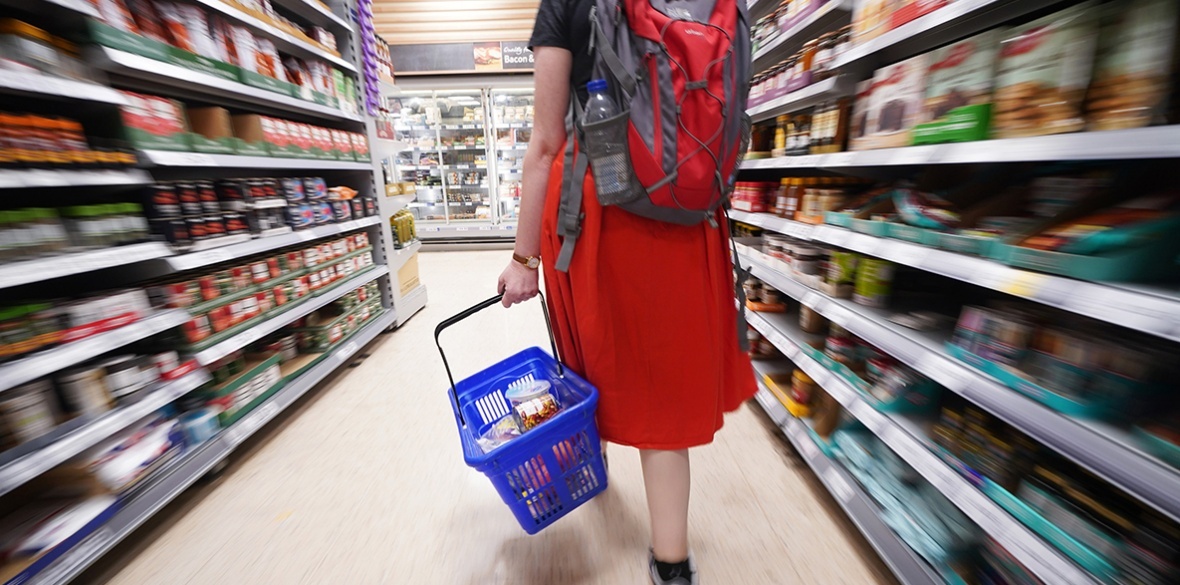This is the last article you can read this month
You can read more article this month
You can read more articles this month
Sorry your limit is up for this month
Reset on:
Please help support the Morning Star by subscribing here
FOOD inflation is up almost 20 per cent on this time last year, new Office for National Statistics showed today.
The consumer prices index (CPI) inflation fell to its lowest level for more than a year last month – but at 8.7 per cent still outstripped average wage increases.
The decline from 10.1 per cent in March was largely down to energy prices stabilising after the sky-high rises from a year ago.
But it was higher than forecast by economists, who had pencilled in a drop to 8.2 per cent in April.
The figures showed food inflation is at 19.3 per cent, down only slightly on March’s 19.6 per cent and remaining close to the highest rate for more than 45 years.
Households continue to face budget-breaking price rises on essentials such as olive oil, up 49 per cent on a year ago, and cheese, now 42 per cent more expensive.
Milk and baked beans are both up 39 per cent.
The Resolution Foundation warned last week that food prices are set to overtake energy bills as the “epicentre” of the cost-of-living crisis and would force low-income households to eat less.
Chancellor Jeremy Hunt and Prime Minister Rishi Sunak admitted food prices are “still rising too fast.”
TUC general secretary Paul Nowak said: “Prices are still rising much faster than wages.
“And families cannot restore their lost living standards without stronger wage growth.
“But Rishi Sunak does not have a plan to get wages rising. And he wants to sack workers who use their right to strike to get a fair pay deal.”
Mr Nowak said working families are suffering from “this government’s failure to get wages growing.”
Disability charity Sense said that the continued hikes are another blow to disabled households who are struggling to make ends meet.
Chief executive Richard Kramer said: “Disabled people are particularly impacted by spiralling costs, as many need to spend more on specialist diets and are dependent on energy-intensive equipment such as feeding machines.
“Increased costs have already pushed almost three-quarters of disabled households into debt, and with food prices only rising there is no end in sight.
“More than half of disabled families that we supported with our cost of living fund told us they needed this money to pay for food.
“No-one should be struggling to put food on the table, but that is the grim reality for disabled families up and down the country.”
Mr Kramer said the government “isn’t doing enough to help” and urged a long-term plan of targeted support.
Which? director of policy and Advocacy Rocio Concha warned that millions of desperate parents and people on low incomes have “no choice but to resort to extreme measures” such as skipping meals.
SNP economy spokesperson Stewart Hosie hit out at 13 years of Tory policies for leaving families worse off.
He said the party will continue to press Westminster to deliver help for families, including by raising universal credit by £25 a week and introducing a real living wage.
Scottish Greens economic spokeswoman Maggie Chapman said the Tories will be “popping open the champagne” on the CPI drop, but the news will be “too little too late” for pensioners struggling to buy food and families “stretched from all angles.”
Shadow chancellor Rachel Reeves said that “never have people paid so much in taxes and got so little in return.”
But Mr Sunak told MPs in Commons that the government is “doing everything we can to help consumers manage the challenges of the cost of living.”
He was responding to SNP Westminster leader Stephen Flynn’s warning that the cost-of-living crisis is now also a “cost-of-greed crisis.”











